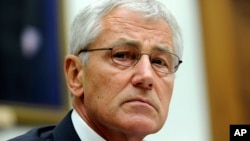U.S. Defense Secretary Chuck Hagel says he wants to build on past progress in strengthening military ties with India, as he arrived in New Delhi Thursday for a two-day visit.
Hagel told reporters on the flight from Germany to India that he wants to find more opportunities for the United States and India to work together, including expanding the potential for joint military exercises and renewing the 10-year Defense Trade and Technology Initiative that expires next year.
India is the world's biggest arms importer and Hagel's visit comes as the U.S. seeks additional defense contracts with the South Asian country. The defense secretary said Thursday, "We are going on what we have built, and we think there are even more possibilities to go further, wider, deeper with things that we have started."
The Indian government says defense trade between the two countries has grown significantly with India purchasing more than $10 billion worth of military equipment from the U.S. in recent years.
The Indian Cabinet this week approved plans to increase the limit on foreign direct investment in India's defense sector from 26 percent to 49 percent.
Hagel's trip to India comes just days after U.S. Secretary of State John Kerry discussed trade, security and climate change during the fifth round of the India-U.S. Strategic Dialogue in New Delhi.
During his visit, Kerry met with India's new Prime Minister Narendra Modi and said that India and the U.S. can become "indispensable partners" in the 21st century. Modi is scheduled to visit Washington in September. He was denied a U.S. visa in 2005 because of allegations he did nothing to stop sectarian riots as chief minister of Gujarat state.
Relations between the two countries have been rocky over the last year due to a number of issues including the detention of an Indian diplomat in New York in December of 2013.
U.S. officials had also pressed India to sign a WTO accord that has been in discussion for months. The Indian government on Thursday defended its decision to block the global trade deal because of concerns that it could hamper its ability to distribute subsidized food to its poor.





